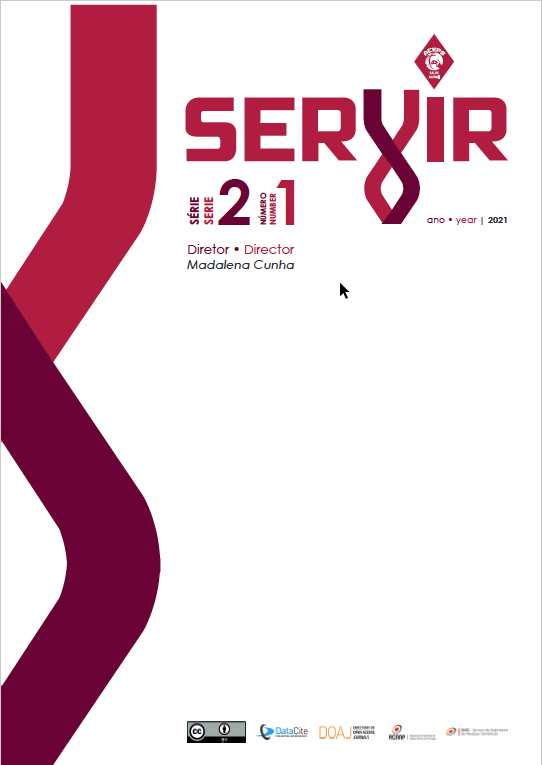Determining factors of spirituality in hospitalized people with chronic Illness
DOI:
https://doi.org/10.48492/servir0201.25863Keywords:
nursing, spirituality, coping skillsAbstract
Introduction: Spirituality is one of the important resources which may help to overcome a moment of crisis and suffering. As nurses and members of amultidisciplinary team, we have every professional, moral, and ethical interest in knowing the spiritual dimension of the chronically hospitalised patient, whichwill allow us to provide more personalised care.
Objective/s: To identify forms of spirituality experienced by the person with a hospitalised chronic illness and determine how they correlate with socio-demographic, family and clinical variables.
Methods: Non-experimental, cross-sectional descriptive-correlational and quantitative study, used in a non-probability convenience sample consisting of 307 individuals. Data were collected through a questionnaire, applied between January and June 2013, to people with chronic pathology in a hospitalenvironment.
Results: Participants report that “spiritual/religious beliefs” give meaning to their life and strength in difficult times and have learned to value the small thingsin life, however less than half of the sample sees their future with hope. The predictors of spirituality were revealed to be “age” (10.4%) and “familyfunctioning” (10.4%), varying positively.
Conclusion: Spirituality is a coping resource highly present in people with a hospitalised chronic disease, and “age” and “family functioning” were predictors ofspirituality.
Downloads
References
Austin, P., Macleod, R., Siddall, P., McSherry, W., & Egan, R. (January 2017). Spiritual care training is needed for clinical and non-clinical staff to manage patients' spiritual needs. Journal for the study of Spirituality, 7:1, 50-63, DOI:10.1080/20440243.2017.1290031
Barbosa, A. (2010). Espiritualidade. Em A. Barbosa, & I. G. Neto, Manual de Cuidados Paliativos (pp. 595-659). Lisboa: Faculdade de Medicina da Universidade de Lisboa.
Batista, S. M. L. P., & Martins, R. M. L. (2021). Factores asociados al sufrimiento en la enfermedad crónica en pacientes hospitalizados en Portugal. Enfermería Clínica. https://doi.org/10.1016/j.enfcli.2020.12.043
Batista, S., & Martins, R. (2016). The suffering from chronic illness as a focus in nursing care. Servir, 59 (2), 57-62. http://hdl.handle.net/10400.19/4447
Caldeira, S., Branco, Z., Vieira, M. (2011) Espiritualidade nos cuidados de enfermagem: revisão da divulgação científica em Portugal. Revista de Enfermagem Referência - III, 5. http://dx.doi.org/10.12707/RIII1133
Krikorian, A., & Limonero, J. (March de 2012). An Integrated View of Suffering in Palliative Care. Journal of palliative care, pp. 41-49. Obtido de https://www.researchgate.net/publication/224955375
Lazarus, R., & Folkman, S. (1984). Stress, appraisal, and coping. New York: Springer Publishing Company.
Leventhal, H., Philips, L., & Burns, E. (Dec de 2016). The Common-Sense Model of Self-Regulation (CSM): a dynamic framework for understanding illness self-management. J Behav Med, 39: 935-946. https://doi.org/10.1007/s10865-016-9782-2
Magalhães, V. P. (2015). Espiritualidade, Esperança e Sentido da Vida em Oncologia. Em E. Albuquerque, & A. S. Cabral, Psico-oncologia: Temas Fundamentais (pp. 399-402). Lisboa: Lidel - Edições Técnicas, Lda.
Martins, R., & Mestre, M. (dezembro de 2014). Esperança e Qualidade de Vida em Idosos. Millenium, 47(19). https://revistas.rcaap.pt/millenium/article/view/8116/5718
Meleis, A. I., Sawyer, L. M., Im, E. O., Hilfinger Messias, D. K., & Schumacher, K. (2000). Experiencing Transitions: An emerging middle range theory. Advances in Nursing Science, 23(1), pp. 12-28. PMID: 10970036
Nazly, E. A., Ahmad, M., Musil, C., & Nabolsi, M. (July-August de 2013). Hemodialisis stressors and coping strategies among Jordain patients on hemodialisys: a qualitative study. Nephrology Nursing Journal, 40(4), pp. 321-327. PMID: 24175441
Ordem do Enfermeiros. (2009). Código Deontológico (Inserido no Estatuto da OE republicado como anexo pela Lei n.º 111/2009 de 16 de Setembro). https://www.ordemenfermeiros.pt/arquivo/legislacao/Documents/LegislacaoOE/CodigoDeontologico.pdf
Ordem dos Enfermeiros. (2011). CIPE Versão 2 - Classificação Internacional Para a Prática de Enfermagem. Santa Maria da Feira: Lusodidacta.
Ordem dos Enfermeiros. (Agosto de 2012). Regulamento do Perfil de Competências do Enfermeiro de Cuidados Gerais. Divulgar, pp. 12-13. https://www.ordemenfermeiros.pt/arquivo/publicacoes/Documents
Perry, A. G., Potter, P. A., & Ostendorf, W. (2020). Nursing Interventions & Clinical Skills, 7th Edition. Missouri: Elsevier. ISBN: 9780323547017
Pinto, C., & Ribeiro, J. L. (2007). Construção de Uma Escala de Avaliação da Espiritualidade em Contextos de Saúde. Arquivos de Medicina, pp. 21(2):47-53. https://repositorio-aberto.up.pt/bitstream/10216/57268/2/85810.pdf
Reis, A., & Menezes, T. M. de O. (2017). Religiosidade e espiritualidade nas estratégias de resiliência do idoso longevo no cotidiano. REBEn, 70(4), 794–799. Retrieved from http://dx.doi.org/10.1590/0034-7167-2016-0630
Silva, V., Neves, I., Paraizo, C., Rodrigues, A., Silva, M., Dias, N., Bem, M., Miareli, A. (feb. 2020). Spirituality and religiosity in elderly with diabetes mellitus. Braz. J. of Develop., Curitiba, v. 6, n.2, p.7097-7114 DOI: https://doi.org/10.34117/bjdv6n2-128
Souza, V. C., Pessini, L., & Hossne, W. (2012). Bioética, religião, espiritualidade e a arte do cuidar na relação médico-paciente. Revista Boiethikos, 6 (2), pp. 181-190. https://www.saocamilo-sp.br/pdf/bioethikos/94/a7.pdf
Timmins F, Caldeira S. Assessing the spiritual needs of patients. Nurs Stand. 2017 Mar 15;31(29):47-53. doi: 10.7748/ns.2017.e10312. PMID: 28294021.
Sequeira, C. & Sampaio, F. (junho 2020). Enfermagem em Saúde Mental - Diagnósticos e Intervenções. Lisboa: Lidel. ISBN: 9789897524134
Wright, L. (2017). Suffering and Spirituality: The Path to Illness Healling. Canadá: 4th Floor Press Inc.
Downloads
Published
How to Cite
Issue
Section
License
In order to promote the free circulation of knowledge, Servir is open access journal. All its content is available and protected under the Creative Commons license (CC BY 4.0).
The journal allows self-archiving in institutional repositories of all versions, which may become immediately available


